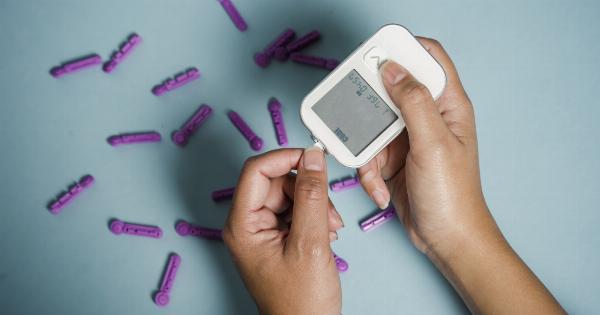In recent years, diabetes has become more prevalent worldwide, affecting millions of individuals.
This chronic condition is characterized by high blood sugar levels, either due to the inadequate production of insulin or the body’s inability to effectively use insulin. While there are various treatment options available, such as pharmaceutical medications and lifestyle modifications, many people are turning to herbal remedies for glucose regulation to complement their existing treatments.
This article aims to explore the benefits of herbal glucose regulation as a defense against diabetes.
The Rising Concern of Diabetes
Diabetes is a major health concern that can lead to numerous complications if not properly managed.
It is classified into two main types: type 1 diabetes, which is usually diagnosed in childhood or adolescence and requires lifelong insulin injections, and type 2 diabetes, which generally develops later in life and is associated with lifestyle factors such as obesity and sedentary habits.
According to the World Health Organization (WHO), the number of individuals living with diabetes has risen from 108 million in 1980 to 422 million in 2014.
This alarming increase can be attributed to factors such as the global rise in obesity rates, unhealthy dietary choices, and the lack of physical activity.
The Role of Glucose Regulation
Effective glucose regulation is crucial for managing diabetes and preventing its complications.
Glucose regulation involves maintaining stable blood sugar levels within a certain range to avoid hyperglycemia (high blood sugar) or hypoglycemia (low blood sugar).
When blood sugar levels rise after a meal, insulin is released by the pancreas to allow glucose to enter the cells for energy production. In individuals with diabetes, this process is disrupted, leading to a buildup of glucose in the bloodstream.
Herbal remedies have gained attention for their potential in regulating blood glucose levels, and many of these plants have been used for centuries in traditional medicine systems for their medicinal properties.
Exploring Herbal Glucose Regulation
1. Cinnamon:.
Cinnamon is a well-known spice that may offer benefits for glucose regulation. Studies have shown that cinnamon extracts can reduce fasting blood glucose levels and improve insulin sensitivity.
It may also have antioxidant properties and help prevent diabetic complications.
2. Fenugreek:.
Fenugreek seeds contain soluble fibers and compounds that can enhance insulin secretion and improve glucose utilization.
Research suggests that fenugreek may help lower fasting blood sugar levels and improve glycemic control in individuals with diabetes.
3. Gymnema Sylvestre:.
Gymnema Sylvestre, also known as the “sugar destroyer,” has been traditionally used in Ayurvedic medicine for its potential antidiabetic properties.
It may help reduce blood sugar levels by blocking the taste of sweetness, suppressing glucose absorption in the intestines, and stimulating insulin release.
4. Bitter Melon:.
Bitter melon, a tropical fruit, contains compounds that resemble insulin and may have hypoglycemic effects. Studies have suggested that bitter melon extracts can lower blood glucose levels by enhancing glucose uptake and utilization in the cells.
5. Ginseng:.
Ginseng, a popular medicinal herb, has been extensively studied for its potential in improving glucose metabolism.
Some studies have shown that ginseng extracts can lower fasting blood sugar levels, enhance insulin sensitivity, and improve glycemic control.
6. Aloe Vera:.
Aloe Vera has been used for its medicinal properties for centuries. Research suggests that Aloe Vera gel may have antidiabetic effects, including lowering blood glucose levels and improving lipid profiles.
It may also help prevent oxidative stress and support pancreatic health.
7. Indian Gooseberry:.
Indian Gooseberry, also known as Amla, is a rich source of antioxidants and bioactive compounds. It has been traditionally used in Ayurvedic medicine for its potential antidiabetic properties.
Indian Gooseberry extracts may help reduce fasting blood sugar levels and improve insulin sensitivity.
8. Ginger:.
Ginger, a widely used spice, contains compounds that exhibit anti-inflammatory and antioxidant effects.
Studies suggest that ginger extracts can help regulate blood sugar levels, improve insulin sensitivity, and reduce markers of diabetic complications.
9. Turmeric:.
Turmeric, a vibrant yellow spice, contains a compound called curcumin, which has been extensively studied for its medicinal properties.
Curcumin may have antidiabetic effects, including lowering blood glucose levels, improving insulin sensitivity, and reducing inflammation.
10. Holy Basil:.
Holy Basil, also known as Tulsi, is an aromatic herb commonly used in traditional medicine systems. It may have antidiabetic properties by reducing blood glucose levels, enhancing insulin secretion, and improving antioxidant defenses.
Considering Herbal Remedies
While herbal remedies show promising potential in glucose regulation, it is important to remember that they should not replace prescribed medications or medical advice.
Herbal supplements should be used under the guidance of a healthcare professional, especially when combined with other antidiabetic medications, as they can interact and affect blood sugar levels.
Furthermore, individual responses to herbal remedies may vary, and not all remedies may be suitable for everyone.
It is essential to consult with a healthcare provider before incorporating any new treatments or supplements into your diabetes management plan.
Conclusion
Herbal glucose regulation offers a supplementary approach to managing diabetes and promoting overall well-being.
The herbs mentioned above, including cinnamon, fenugreek, Gymnema Sylvestre, bitter melon, ginseng, Aloe Vera, Indian Gooseberry, ginger, turmeric, and Holy Basil, may provide benefits in controlling blood sugar levels, improving insulin sensitivity, and reducing diabetic complications.
However, it is crucial to emphasize that herbal remedies should be used in conjunction with prescribed medications and lifestyle modifications for an effective diabetes management plan.
Consulting with a healthcare professional is essential to ensure proper dosage, minimize potential interactions, and monitor overall health status.



























